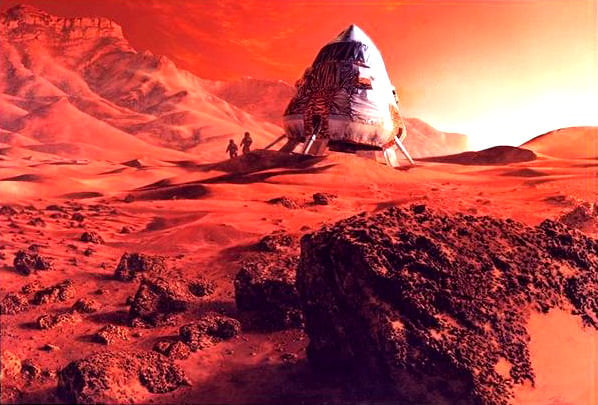If I told you that your great, great, great grandkids would be building houses on that crimson world known as Mars, what would be the first thought to enter your head?
Rovers? Check! A comfy Martian house? Check! Power cutting rock tools? (for us guys) Double check! A bio fuel gas tank? Che--huh?!
You're probably wondering "what power on Earth would motivate you to bring bio fuels to Mars?" The answer: a slightly altered
cyanobacterium
that may help us power future Martian rovers, homes--and yes--power tools with good ol' biofuel.
The problem with settling Mars is this: despite its dazzling
desert environment
(if you consider frozen dry tundra's dazzling), Mars is not the most ideal location when it comes to the energy department.
The red planet receives
approximately half
of the sunlight Earth does, which may dim a green geeks hope of a solar powered outpost offworld.
Worse, even if solar panels received 100% of the energy from the Sun, those big, bad
global dust storms
could make solar panels useless for weeks or months at a time.
The only thing "big red" has to offer future settlers is rust, dust and lots of CO2--the latter which can be converted into fuel thanks to our new best (microscopic) friend cyanobacterium.
Scientists have been studying this little creature and have found that with a "few" alterations, cyanobacterium can take CO2 (the gas that can easily kill you) and turn it into a biofuel called
isobutanol
.
Converted, isobutanol could help colonists power rovers, Martian settlements--and yes, even power tools (as cutting rocks with lasers is going to require lots of energy folks!) without the need to depend upon the Sun or an underground
miniature nuke
(which might be too expensive for small outposts).
Since bio fuels
can't openly burn
in the carbon atmosphere, future rovers, houses and power tools will need to be altered to also carry oxygen as well (which we could extract from the ever abundant Martian ice).
By having an inexpensive and (hopefully) cheap fuel, establishing homes and traveling the Martian globe could become a reality without the heavy (and sometimes "helpful") hand from governments and mega-corporations.
Image Credit:
Paul Hudson
via NASA
Sources:
Alternative Energy News,
Physorg.com
 Universe Today
Universe Today
